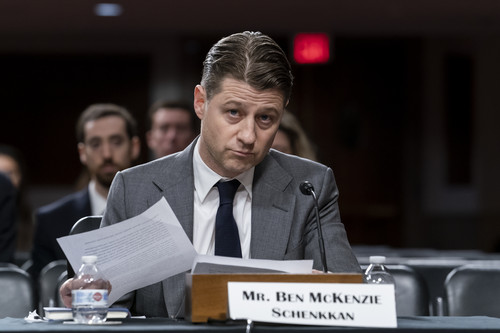Yesterday, former president Trump took to his Truth Social media platform to announce that he would be making “a MAJOR ANNOUNCEMENT” today. Since he recently threw his hat in the ring for president in 2024, there was a great deal of speculation about what political move this would be.
When it came today, it turned out that his announcement was for digital trading cards with images of him as a superhero…available for $99 apiece. Radio personality John Melendez promptly called them “Broke’mon cards.”
Ron Filipkowski, a former federal prosecutor and Republican who now monitors right-wing extremism, tweeted: “All I can say is that those of us who have lost friends, fought with relatives, resigned positions, been called traitor, left our party, all because we saw very clearly what a con-man, huckster and fraud this man is, have never felt more vindicated.”
The reduction of the former president to a cartoon grifter seems likely to have political repercussions. Right-wing media personality Baked Alaska, who is facing six months in jail after pleading guilty to parading, demonstrating or picketing inside a Capitol building for his participation in the January 6 attack on the U.S. Capitol, tweeted: “i can’t believe i’m going to jail for an nft salesman,” with a sad face emoji.
Meanwhile, three members of the “Wolverine Watchmen” who hatched a plot to kill police and elected officials and to kidnap Governor of Michigan Gretchen Whitmer in summer 2020 as Trump urged his supporters to “LIBERATE” the state from her coronavirus restrictions were sentenced today to a minimum of 7 to 12 years in prison. Kara Berg of The Detroit News recorded their reactions: "I had a lapse in judgment," said one; "I sincerely regret ever allowing myself to have any affiliation with people who had those kinds of ideas,” said another; "I was caught up highly in the moment,” said a third. Michigan attorney general Dana Nessel noted that, “appropriate consequences for illegal acts are necessary to deter criminal behavior.”
Trump’s political star is fading, leaving the Republican Party without plan or policy: recall that in 2020, for the first time in its history, the party didn’t write a political platform. Instead, it said that if it had written a platform, it “would have undoubtedly unanimously agreed to reassert the Party’s strong support for President Donald Trump and his Administration.” Going forward, they simply resolved “[t]hat the Republican Party has and will continue to enthusiastically support the President’s America-first agenda.”
Now the former president is increasingly toxic. As the party tries to find someone to blame for its poor 2022 showing, some seem to have concluded the party hasn’t been extremist enough. Republican National Committee chair Ronna McDaniel, who remade the party to serve Trump, is now in a fight to keep her position, challenged by a woman who has backed election challenges and worked directly as Trump’s lawyer, rather than coming up from within the party.
The lawmakers Trump helped to usher into Congress are also doubling down on their extremism. In 2022 the Republicans just barely won control of the House—and that with the help of gerrymandered districts—leaving them very little room to argue with each other.
But while leadership in the Senate is determined by the party in power alone, the speakership of the House is voted on by the whole House. This means that with such a small majority, current House minority leader Kevin McCarthy (R-CA), who intends to become House speaker, can lose only a few votes and yet win.
The far-right wing of his conference, some of whom were prominent in the newly released texts to and from Trump chief of staff Mark Meadows as they tried to keep Trump in power despite the will of the voters, have said they will not back McCarthy. He appears to have promised them plum committee assignments, investigations, and even impeachments, but so far, they aren’t budging.
Today, McCarthy put off the choosing of committee leadership slots until after the January 3 election for speaker, which also means the Republican membership of the committees is unclear (in contrast, the Democrats will have made their decisions by next week). This enables McCarthy to use seats as leverage—Marjorie Taylor Greene (R-GA), who was stripped of her committee assignments in this Congress, has already said she expects a prime spot on the Committee on Oversight and Reform—but it also means that the House cannot organize to start the upcoming session. It can’t even hire staff.
Republicans who style themselves the “governing wing” of the party are quietly talking about stripping their more extreme members from committees. “From a governing perspective, it’s important that Republicans don’t start January 3 by going face down and not having some clarity as to what we’re going to be able to accomplish,” Representative Steve Womack (R-AR) told Annie Grayer and Melanie Zanona of CNN. “We need to be able to hit the ground running and demonstrate to the American people that the trust and confidence they’ve given to us by giving us a majority, albeit slim, was a good decision.”
Indeed. And first on that list is keeping the government funded. Yesterday, the House approved a stopgap funding measure to keep the government operating another week while Congress prepares an omnibus bill to fund — until the end of the fiscal year on September 30, 2023. The omnibus bill must be bipartisan to get through the Senate, but House Republican leaders urged Republican members to vote against the short-term measure, saying it was an “attempt to buy additional time for a massive lame-duck spending bill in which House Republicans have had no seat at the negotiating table.” Nine Republicans voted for it nonetheless, but at the very least, it seems that negotiations next year will be difficult.
Meanwhile, over at the White House, President Joe Biden has spent the last three days hosting the U.S.-Africa Leaders Summit. Both Russia and China have invested heavily in Africa in the past, and Biden, who is trying to weaken Chinese and Russian power around the globe, announced that the U.S. is committed “to expanding and deepening our partnership with African countries, institutions, and people.” This week he announced not only that he backs the African Union’s membership in the G-20, the intergovernmental forum of leading economies, but that the U.S. will invest at least $55 billion in the continent over the next three years. The U.S. hopes to work with African nations on issues of security, health, food security—Somalia is facing drought conditions that will affect food supplies, while the Russian invasion of Ukraine has cut down fertilizer shipments to Africa more generally—climate change, corruption, and so on.
Biden announced that he and Vice President Kamala Harris, as well as Dr. Jill Biden, Second Gentleman Douglas Emhoff, and several members of the Cabinet, will travel to the African continent in 2023 to demonstrate the U.S. commitment to African countries and citizens.
But while the White House this week was all about geopolitics and representation, the person who handles the president’s personal Twitter account apparently couldn’t resist poking a little fun at Trump’s news. “I had some MAJOR ANNOUNCEMENTS the last couple of weeks, too…” the account read:
“Inflation’s easing
I just signed the Respect for Marriage Act
We brought Brittney Griner home
Gas prices are lower than a year ago
10,000 new high-paying jobs in Arizona”
If the Democrats are trying to portray themselves as the competent party, the Republicans seem to be trying to give them a leg up.
—
Notes:


https://www.presidency.ucsb.edu/documents/resolution-regarding-the-republican-party-platform
https://www.npr.org/2022/11/12/1136267788/how-redistricting-affected-the-outcome-of-the-elections
https://www.state.gov/africasummit/
https://www.washingtonpost.com/lifestyle/2022/11/30/marjorie-taylor-greene-house-majority-committee/
https://www.voanews.com/a/russia-steadily-rebuilding-presence-in-africa/6452193.html
https://www.iisd.org/articles/chinese-investment-africa-bilateral-trade-decline
https://www.michigan.gov/ag/news/press-releases/2022/12/15/wolverine-watchmen-sentenced
https://www.cnn.com/2022/12/15/politics/militia-members-sentenced-whitmer-kidnapping-plot/index.html
https://www.cnn.com/2022/12/15/politics/moderate-republicans-kevin-mccarthy-speaker/index.html
https://www.cbsnews.com/news/house-approves-short-term-government-funding-bill-heads-to-senate/
https://www.nytimes.com/2022/12/12/us/politics/republican-national-committee-rnc.html
https://www.brookings.edu/blog/africa-in-focus/2022/02/02/the-future-of-russia-africa-relations/














